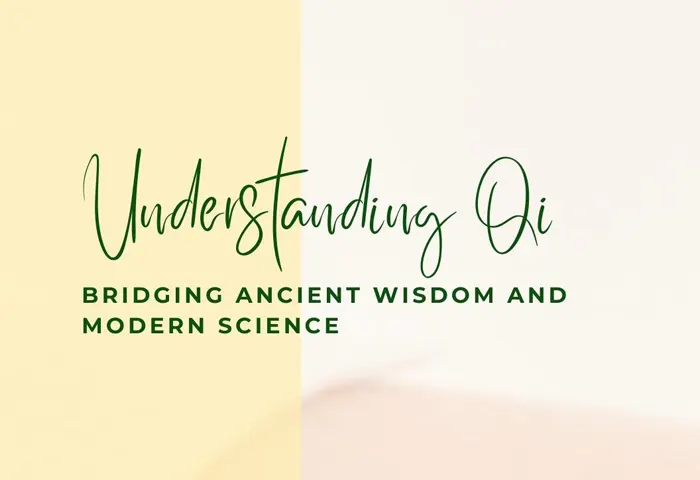Qi energy healing: Bridging Ancient Wisdom & Modern Science
Exploring the Essence of Qi and its Healing Potential
Qi energy healing is rooted in the understanding of Qi. But what is Qi?
Qi (pronounced “chee”) is often described as vital energy, the invisible force that fuels every physical and mental function in the body. Derived from the air we breathe and the food we consume, Qi ensures energy, health, and balance. When Qi flows smoothly and abundantly, we feel energized and healthy. However, when Qi becomes stagnant, depleted, or imbalanced, it can lead to fatigue, illness, or emotional distress, and this is where qi energy healing can help.
Why Is Qi Hard to Understand?
Qi can be a challenging concept for two reasons:
-
Language Barrier: In Chinese culture, the character for Qi combines “air” and “rice,” symbolizing how energy comes from both breath and food.
-
Intangibility: Qi is abstract and unseen, unlike physical objects. It exists conceptually as the energy that sustains life, making it harder to visualize, to help you see qi energy healing.
Qi and Modern Science: A Natural Connection
While Qi is an ancient idea, it aligns closely with modern scientific concepts of energy, where qi energy healing is an important piece:
-
Energy from Air: The oxygen we breathe fuels cellular functions, similar to how Qi supports biological processes.
-
Energy from Food: Nutrients from food are converted into ATP (adenosine triphosphate) in the mitochondria, which powers our cells. This mirrors the role of Qi as the energy derived from food to sustain life, which you can access with qi energy healing.
How Is Qi Assessed?
Modern Medicine
In modern medicine, Qi is indirectly assessed through measurements like:
-
Energy levels (fatigue, vitality)
-
Digestion and metabolism
-
Heart rate, brainwaves, and temperature
-
Muscle activity and overall physiological functions
When you report symptoms like low energy, poor digestion, or emotional imbalances, you’re describing the state of your Qi. Assessing your Qi is the first step with qi energy healing.
Traditional Chinese Medicine (TCM)
A Chinese Medicine practitioner uses physical diagnostics and a detailed intake of symptoms to assess Qi. Evaluations may include:
-
Pulse quality and tongue assessment
-
Body temperature and sweat patterns
-
Physical pain or discomfort
-
Energy levels and sleep quality
-
Digestive, respiratory, and nervous system function
-
Emotional tendencies (stress, anxiety, etc.)
-
Urination, bowel movements, and reproductive health
-
Skin, nails, and head/neck evaluations
These holistic assessments help identify imbalances in Qi and guide personalized treatment plans that is incorporated in qi energy healing.
 Restore and Balance Qi for Better Health
Restore and Balance Qi for Better Health
Qi is responsible for maintaining the vitality of your body, mind, and spirit. By understanding Qi, you can gain deeper insight into your symptoms and identify areas that need attention, where qi energy healing can help you in this process.
Ways to Restore Qi Flow using qi energy healing:
-
Acupuncture treatments to stimulate energy flow and relieve stagnation
-
Herbal medicine tailored to your unique needs
-
Dietary adjustments to nourish and sustain energy
-
Lifestyle practices like breathing exercises, mindfulness, and movement which are essential to qi energy healing.
When you are consistent, you will see the benefits of qi energy healing.
Take the Next Step Toward Balance and Vitality
If you’ve been feeling “off” or struggling with low energy, digestion, or emotional imbalances, understanding and balancing your Qi could be the key to feeling better with Qi energy healing.
Our clinic offers personalized Traditional Chinese Medicine treatments to assess and restore Qi flow, addressing your specific health concerns with Qi energy healing.
Don’t wait—take charge of your well-being today: Book an appointment with me and begin your journey to a more balanced, energized, and vibrant life!







 Restore and Balance Qi for Better Health
Restore and Balance Qi for Better Health